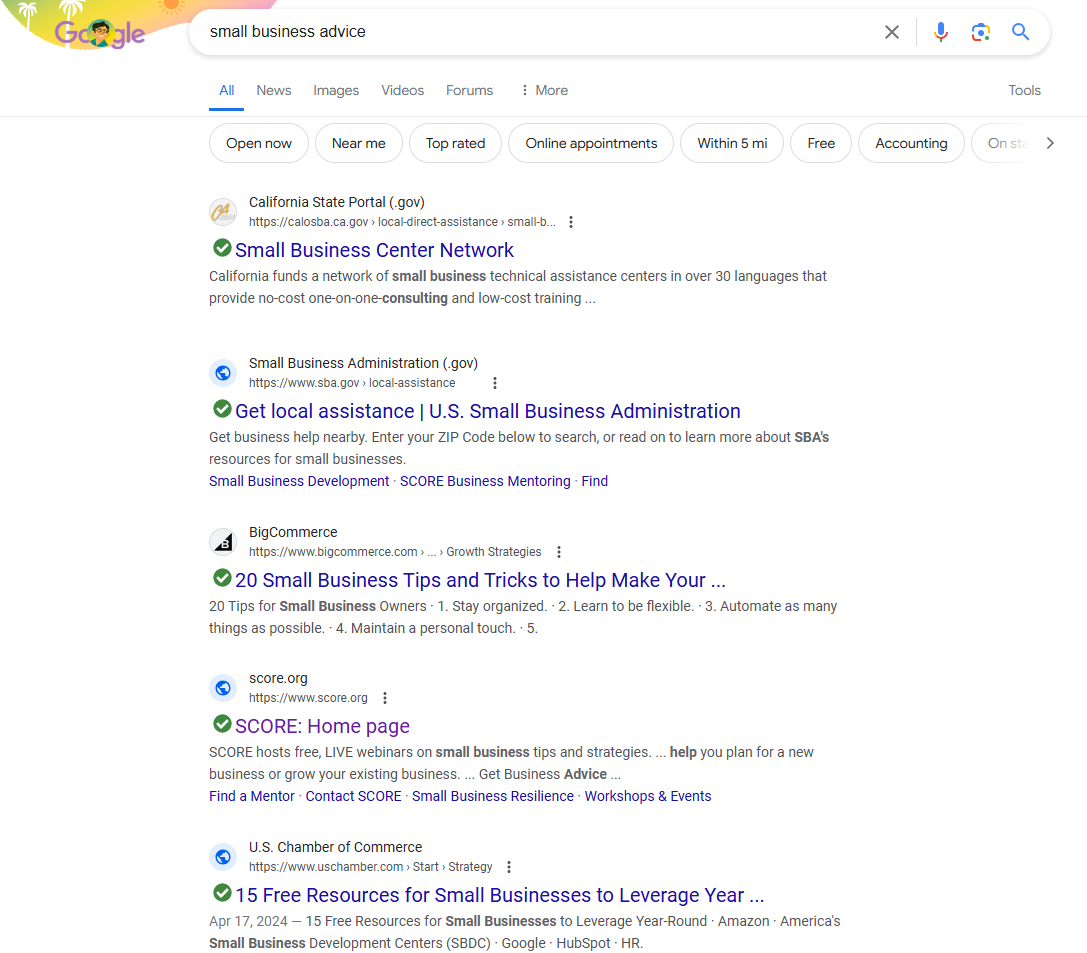Google’s AI Overview and Reddit threads are at the top of search results, making less space for organic website pages and blog posts. How will these changes impact the future of SEO?
If you think I’m going to give you a list of best practices, think again.
In fact, I’m going to show you exactly why you need to stop pretending you know what works (no matter how long you’ve been in the SEO game).
As a SaaS copywriter who primarily writes SEO-optimized landing pages and blog posts, I’m always curious about what Google really wants.
Google is my fickle mistress. Does she still want comprehensive guides? Or has the advent of AI assistants killed the need for content writers to add definitions at the top of everything?
Google’s March 2024 update crushed spammy, AI-generated content. The aim was to penalize sites that clearly used AI to publish content at scale—of course, that’s just marketing speak for posting hundreds or even thousands of articles in a matter of months.
Personally, I rarely write with AI. It can be helpful for coming up with checklists or assisting with SEO content strategy, but the writing tends to be overly stiff, since all of the sentences have a similar grammatical structure and length. So I didn’t see any of my clients’ websites negatively impacted by this update. But, I did notice that some articles that I know were written with AI by other writers are still ranking. And that shouldn’t come as too much of a surprise. In their announcement, Google added this update:
As of April 19, we’ve completed the rollout of these changes. You’ll now see 45% less low-quality, unoriginal content in search results versus the 40% improvement we expected across this work.
Search results show 45% less AI-generated content—meaning there’s still a lot of it out there. If writers use it occasionally for certain sections but edit for accuracy and style, there shouldn’t be too much concern. Google penalized sites that overused AI, but it didn’t remove helpful, relevant, well-structured articles that were partially written with AI.To be safe however, I’m still using AI for 10% or less of the actual writing.
Nonetheless, many SEO professionals are wondering how this will impact their content now and in the future.
Benard Huang, the founder of the popular content optimization tool Clearscope recently hosted a webinar with Moz to talk all about how he thinks that as Google adds their AI Overview to the top of search engine results, the search algorithm will prioritize articles with unique perspectives—and deprioritize boring, repetitive SEO articles with definitions, benefits, steps, etc. This blog post is partly inspired by that webinar and by my own experience reviewing search engine results pages and client rankings.
Some SEO predictions for 2025
What will SEO look like in the future? Here are some of my predictions for what will change in 2025.
Google favors concision
With AI having the power to generate all sorts of text for us, we’ll no longer need ridiculously long blog posts. For many keyphrases, under 2000 words will do. The game will become fitting more dense information in smaller wordcounts instead of being verbose.
Google improves its AI Overview and adds it to more SERPs
There are lots of news stories about how Google’s AI Overview gave hilariously inaccurate information. In the near future, we can expect Google to improve this feature, roll it out to more users, and include it on more search engine results pages.
Google deprioritizes skyscraper content
Brian Dean of Backlinko popularized the skyscraper method, where you write a ton of H2s and H3s to cover every subtopic under the sun in your blog post. According to Ahrefs, Backlinko has recently lost 15% of its traffic. This might be proof that this strategy is seen as overly verbose.
Google serves up a variety of results (instead of copycat articles)
In the past, professional SEOs would just try to copy or one-up what was on the SERPs. But in the future, Google will continue to do a better job of giving a variety of results—some listicles, some guides, some contrarian view points, etc. So, the game shouldn’t be to copy top rankings, but instead to provide alternate viewpoints and information for Google to surface for users.
Google ranks Reddit and Quora results even higher
Google is all about serving the end user. Instead of forcing people to type “Reddit” or “Quora” at the end of their search queries, Google now ranks forum results at the top or middle of the page for the vast majority of searches. You can expect to see more of this in 2025, because Google is committed to giving searchers what they want.
Searches scroll lower down the SERP
It used to be that the top spot got all the traffic. That probably won’t be the case in the future. With Google giving more varied results (instead of different companies’ versions of the same comprehensive guide), users will have more reasons to review the entire SERP before choosing what to click on. And if someone is looking for a solution or service, they’ll ignore the AI Overview response and keep scrolling. Of course, getting on page 1 is still essential.
What you can do to prepare for the future of SEO
If you want to prepare for the future of SEO, then here’s what you need to do differently in 2025.
1. Stop copying everybody else
Study the SERP more than your boss’s briefs (sorry, boss).
Many content managers are using outdated best practices. They take a look at the SERP and build briefs that essentially copy what other people are doing.
That’s not going to keep working.
Google wants to give users a few different options—not slightly rehashed versions of the exact same article on different websites.
For example, if I search “small business advice,” I see government websites, a list of tips, a mentoring foundation, a list of free resources, and a step-by-step guide to starting a small business. The first several results are all completely different.

Google is getting better and better at switching up the search results for all sorts of keyphrases, so don’t be afraid to zig where others zag. In fact, you’ll like get better results.
2. Test more content formats
When in doubt, uplevel your formatting.
For one of my clients, I’ve come up with a new formatting style that is not only easier to write than an in-depth list of 25 tools with features, pros, cons, and pricing—but is also ranking higher.
This has allowed us to secure rankings for very high-volume, high-competition keyphrases related to widgets, tools, software, etc.
I’m not going to give away the format here, because I don’t want other SEO professionals to start copying it. (Just fill out my contact form if you want to work with me and see some of my samples.)
But I will say this: if you’re struggling to boost your overall rankings, try to format things better. Use more subheadings, bold text, bullet points, etc.
As for the point above, try your own formatting experiments instead of just copying the way that other sites are using H3s and bold text.
3. Take more at-bats
The companies that win are the ones who publish a decent amount of content—not so much that something looks fishy, but not so little that they don’t stand a chance.
The truth is that we SEO content writers love to come up with best practices. But Google—the fickle mistress we’re all pining for—doesn’t care. She doesn’t rank our articles just because we follow best practices. She ranks what she wants when she wants.
For example, I just tried some software searches and here’s what I found as of the time of writing on June 6, 2024:
- CRM software – The top result is a guide. What is CRM Software? A Comprehensive Guide and Historical Overview of CRM by Salesforce.
- email marketing software – The top result is a listicle with 11 items. The Best Email Marketing Software for 2024 by PCMag.
- business travel software – The top result is an overview of listings with real user ratings. Best Corporate Travel Management Software Reviews 2024 on Gartner.
All of these searches end in “software” but the winning results are completely different formats.
So how can SEOs tell you to do the same thing for every article? How can they say they know what works? They don’t know. They’re just pulling your teeth.
And when they rank something, they’ll think that means they need to do the same thing across all other blog posts. And sure, maybe it’ll work, maybe it won’t.
The only thing that really works is doing MORE.
Publish more high-quality content. Get out as much high-quality, on-brand content as you can. That works, because you have more chances. You have more lottery tickets, so to speak.
4. Speed up your publishing process
Improving your internal processes is one of the best things you can do to compete in the future of SEO.
I’ve discussed above why more is better. Optimizing your publishing process is the secret to getting out more content.
You can use a platform like StoryChief (my favorite) or CoSchedule to bring briefing, writing, reviewing, and publishing under one roof.
Or, empower your internal content managers to publish more. Some founders and marketing leaders are so meticulous that they want to read and review each and every article. I guarantee this is crushing your potential. Make a style guide, clarify the no-no’s, and get out of the way so your team can publish more content faster.
5. Share your unique take
Because Google is doing an increasingly better job of surfacing different formats and types of results, you need to give Google something fresh.
Share your unique perspective, using these strategies:
- Proprietary data
- Customer stories
- Quotes
- In-house expertise
Don’t just add snippets to your article, but allow your unique perspective to shape the outline.
If you don’t have the time or budget to source quotes from your internal team or customers, hop over to YouTube. Watch a video on the topic, transcribe the best parts, and quote the speaker, linking back to their YouTube video and website. Now you’ve got something fresh and insightful to add to your article.
6. Stuff subtopics—not keywords
The more subtopics and related topics you can cover in a single paragraph, the better. People don’t want to scroll through lengthy content, but they still want all of the information.
In the future of SEO, concision wins. Professional copywriters have already been playing this game for decades. When writing ads, we stuff benefits and campaign terms into 30 characters.
Now it’s time for SEO writers to condense their research and advice into fewer words.
Stuff those paragraphs full of rich, relevant subtopics so Google gets all of the details it wants and readers aren’t aggravated by too much scrolling.
7. Add more details—not just statistics
Remember how I said SEOs are full of crap when they pretend to know what works? Not every article needs to start with a statistic. Not every article even needs a statistic anywhere.
But every article does need details.
Here are some ideas:
- The historical context
- More descriptive language
- Examples
- Lists
- Resources
- Analogies and metaphors
- Humor
- Infographics
- Embedded videos
- Anecdotes
8. Don’t be afraid to use different points of view
You know what’s funny about SEO?
The word you.
That’s known as writing in second person, and nowhere else in the world do we see the second-person point of view as much as we do in SEO.
Do you want to grow your business? To grow your business, you need to…
Almost every blog post is written this way, and beyond tiresome.
Sure, most companies will still write using second-person perspective, but in the future of SEO, as Google continues to surface more varied results, we’ll need other perspectives too.
Journalists do this well. Celebrity interviews, for example, usually feature “I” and “she” statements.
Here’s an example I just whipped up:
I was so nervous to meet the queen of rock and roll, my armpit stains were big enough to swim in. But the moment she sat down, her smudged eye makeup made me feel okay with being human.
I believe that in the future of SEO, we’ll have more freedom to write using other perspectives, because Google wants variation.
9. Write better hooks
We know that pages that don’t perform well will start to lose their rankings. To have a chance at securing new rankings—and to hold the ones we’ve got—we need to really hook people in. Most people won’t read the whole 2000-word article, but they’ll read the first 100 words.
So take your time to make your hooks as interesting as possible.
That’s what I think matters going into 2025! I’ll be sure to come back and update my predictions and advice later next year.

